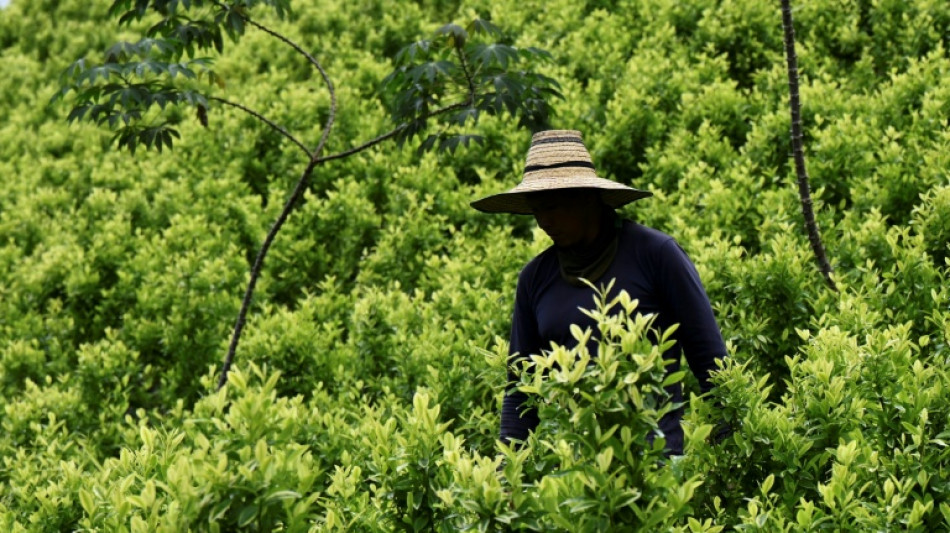
-
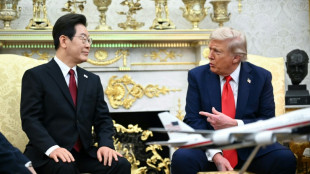 Trump says he wants to meet North Korea's Kim again
Trump says he wants to meet North Korea's Kim again
-
Alcaraz makes US Open bow, Venus Williams returns

-
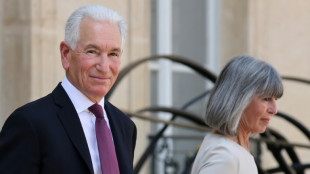 US backs ambassador to France in antisemitism row
US backs ambassador to France in antisemitism row
-
French PM's job on line with call for confidence vote
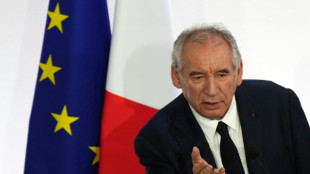
-
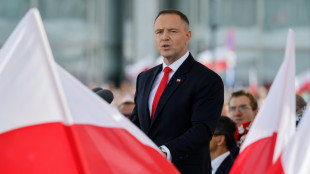 Polish president blocks law extending Ukrainian refugees' rights
Polish president blocks law extending Ukrainian refugees' rights
-
SpaceX megarocket prepares for next launch amid new scrutiny
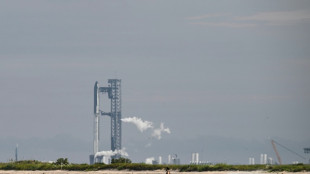
-
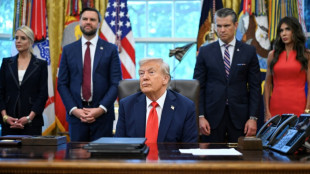 Trump eyes N.Korea meet as he ambushes S.Korea leader
Trump eyes N.Korea meet as he ambushes S.Korea leader
-
Medvedev 'needs help' after US Open meltdown: Becker

-
 Shi hopes 'new image' will help break his badminton worlds hoodoo
Shi hopes 'new image' will help break his badminton worlds hoodoo
-
Gaudu pulls away from Vingegaard to take Vuelta stage

-
 Musk's xAI sues Apple, OpenAI alleging antitrust violations
Musk's xAI sues Apple, OpenAI alleging antitrust violations
-
Top UK screenwriter Laverty arrested at pro-Palestine protest

-
 US studio unearths fossilized dinosaur game 'Turok'
US studio unearths fossilized dinosaur game 'Turok'
-
Trump advisor says US may take stakes in other firms after Intel
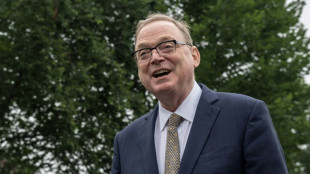
-
 Russia holds secretive espionage hearing against French researcher
Russia holds secretive espionage hearing against French researcher
-
Salvadoran man in Trump immigration row to be deported to Uganda: officials
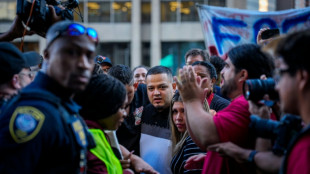
-
 Typhoon Kajiki lashes Vietnam, killing one as thousands evacuate
Typhoon Kajiki lashes Vietnam, killing one as thousands evacuate
-
Bologna new boy Immobile out for eight weeks with thigh injury

-
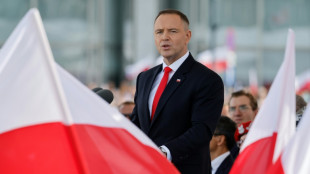 Polish president blocks law to extend social welfare to Ukrainian refugees
Polish president blocks law to extend social welfare to Ukrainian refugees
-
Five journalists among 20 killed in Israeli strikes on Gaza hospital

-
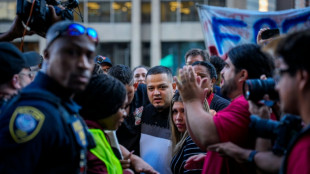 Salvadoran man at center of Trump immigration row detained again
Salvadoran man at center of Trump immigration row detained again
-
Five journalists among 20 killed in Israeli strikes on Gaza hospital: civil defence

-
 Telegram's Durov blasts French probe one year after arrest
Telegram's Durov blasts French probe one year after arrest
-
African players in Europe: Another historic goal for Ndiaye

-
 Amorim warns Mainoo he must fight for his Manchester United place
Amorim warns Mainoo he must fight for his Manchester United place
-
Portugal counts the cost of its biggest ever forest fire
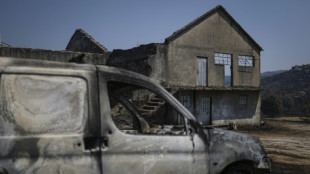
-
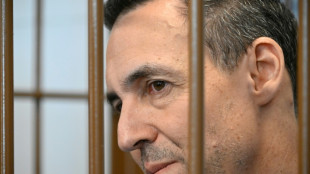 Russia to hold espionage hearing against French researcher
Russia to hold espionage hearing against French researcher
-
Rooney forecasts 'massive future' for Arsenal teen sensation Dowman

-
 Four journalists among 15 killed in Israeli strikes on Gaza hospital: civil defence
Four journalists among 15 killed in Israeli strikes on Gaza hospital: civil defence
-
India cricket ends $43.6 mn sponsorship after online gambling ban: report

-
 France's sole Paris Olympics athletics medallist Samba-Mayela to miss worlds
France's sole Paris Olympics athletics medallist Samba-Mayela to miss worlds
-
Springboks recall Jasper Wiese, but brother Cobus misses out

-
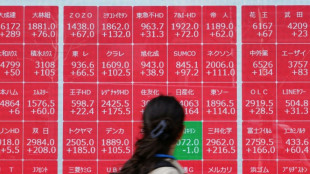 Asian markets rally on US rate cut hopes
Asian markets rally on US rate cut hopes
-
Zanele Muholi, S.African photographer reclaiming identity

-
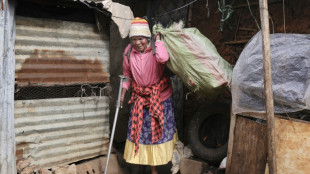 'Restoring dignity': Kenya slum exchange offers water for plastic
'Restoring dignity': Kenya slum exchange offers water for plastic
-
Sabalenka, Djokovic into US Open round two as fuming Medvedev exits

-
 Human ancestor Lucy gets first European showing in Prague
Human ancestor Lucy gets first European showing in Prague
-
China Evergrande Group delisted from Hong Kong stock exchange

-
 A healer and a fighter: The double life of UFC star Shi Ming
A healer and a fighter: The double life of UFC star Shi Ming
-
US Open chaos as Bonzi ousts raging Medvedev

-
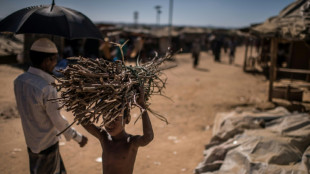 Bleak future for Rohingya, as Bangladesh seeks to tackle crisis
Bleak future for Rohingya, as Bangladesh seeks to tackle crisis
-
Cambodia MPs pass law allowing stripping of citizenship
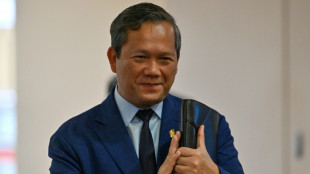
-
 What to look for at the Venice Film Festival
What to look for at the Venice Film Festival
-
Venice welcomes Julia Roberts, George Clooney to film festival

-
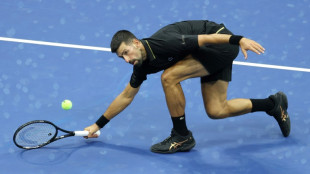 Djokovic voices physical concerns after US Open win
Djokovic voices physical concerns after US Open win
-
Olympic Council of Asia says Saudi Winter Games 'on schedule'

-
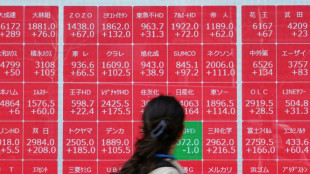 Asian markets rise on US rate cut hopes
Asian markets rise on US rate cut hopes
-
Vietnam evacuates tens of thousands ahead of Typhoon Kajiki
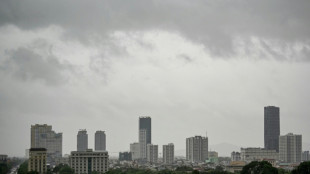
-
 Sabalenka into US Open second round, Djokovic off the mark
Sabalenka into US Open second round, Djokovic off the mark
-
Australian mushroom meal survivor says 'half alive' after wife's killing

| CMSD | 0.25% | 24.01 | $ | |
| CMSC | 0.21% | 23.8 | $ | |
| RYCEF | 0.14% | 14.08 | $ | |
| NGG | -1.02% | 70.69 | $ | |
| RBGPF | 2.74% | 76 | $ | |
| SCS | -0.4% | 16.435 | $ | |
| AZN | -1.78% | 79.555 | $ | |
| RIO | -0.61% | 62.31 | $ | |
| VOD | -0.48% | 11.863 | $ | |
| BTI | -1.07% | 57.89 | $ | |
| BCC | -1.72% | 89.68 | $ | |
| BCE | -0.61% | 25.335 | $ | |
| GSK | -1.41% | 39.63 | $ | |
| BP | 0.52% | 34.92 | $ | |
| JRI | 0.07% | 13.46 | $ | |
| RELX | -1.18% | 47.875 | $ |

Aiming a blow at narcos, Colombia pays farmers to uproot coca
With cocaine production at an all-time high, Colombia's government is testing a pacific approach to its narcotics problem: paying farmers to uproot crops of coca, the drug's main ingredient.
Among the beneficiaries are Alirio Caicedo and his son Nicolas, who a decade ago planted an expanse of coca as they staked their future on the continued patronage of criminal gangs.
Today, they are uprooting the crops and hoping for the best.
The Caicedos and some 4,000 other Colombian families have entered into a pact with the government to replace their coca with alternative crops such as cocoa and coffee.
It is part of a $14.4 million project to reduce supply of a product blamed for untold misery in a country where armed groups force rural communities to grow coca and raze forests for its cultivation.
The project seeks to eradicate coca production on 45,000 hectares in three of Colombia's most conflict-riddled regions, including the southwestern Micay Canyon where the Caicedos ply their trade in the Argelia municipality.
For farmers it is a risk.
They cannot be sure that their new plantations -- coffee in the Caicedos' case -- will succeed, or that guerrillas and other groups whose income depend on cocaine sales will leave them in peace.
"When one is planting a coca plant, there is hope that in time... there will be a harvest and there will be some income," Nicolas Caicedo, 44, told AFP while he and his dad, 77, shoveled and tugged at the remaining coca shrubs on their property.
"Uprooting the plants means that... there will be no more harvests -— in other words, no more money," from coca at least.
With coca, the Caicedos said they were guaranteed an income of about $800 per month.
They have received an initial payment of about $300 under the project to grow coffee, with more to come.
But another farmer, who spoke to AFP on condition of anonymity, said he doubted the project could work in areas such as Argelia where illegal groups outnumber the state in terms of fighters and guns.
"No armed group that lives off (coca) is going to want a farmer to stop growing coca and switch to coffee," he said.
- 'Naive' -
Gustavo Petro, Colombia's first-ever leftist president, took office in 2022 with the goal of extricating his country from the US-led "war on drugs" blamed for double-victimization of rural Colombians already living under the yoke of violent criminal groups.
On his watch, cocaine production in Colombia -- the world's biggest exporter of the drug -- reached record levels as demand continues to grow in Europe and the United States -- the principal consumer.
Several previous attempts to get Colombian coca producers to change crops have failed as armed groups caused havoc and government payments and other assistance eventually dried up.
For Gloria Miranda, head of Colombia's illegal crop substitution program, told AFP would be naive to think this new program will end drug trafficking "as long as there is a market of 20 million consumers and it (cocaine) remains illegal."
In his stated quest for "total peace," Petro has sought to negotiate with a variety of armed groups, meaning fewer military operations and the abandonment of forced coca eradication.
But talks have mostly broken down, and the arrival of Donald Trump in the White House in January has ramped up pressure on Bogota.
The Trump administration is reviewing Colombia's certification as an ally in the fight against drugs -- a move that could restrict millions of dollars in military aid.
With high stakes for its crop replacement gamble, observers fear the government may be taken advantage of.
Some farmers may "try to deceive" by taking the money while continuing to grow coca, Argelia government secretary Pablo Daza told AFP.
Without adequate monitoring, "the chances are quite high that we are wasting money," added Emilio Archila, who oversaw a similar, failed, project under former President Ivan Duque.
Miranda assures there will be "meticulous" satellite monitoring, and anyone found not to be complying will be expelled from the program.
Used not only for cocaine, the coca leaf is also chewed as a stimulant in Andean countries or brewed into a tea thought to combat altitude sickness.
Colombia's appeals for the leaf to be removed from a UN list of harmful narcotics so it can be commercialized in alternative products such as fertilizers or beverages, have so far fallen on deaf ears.
N.AbuHussein--SF-PST
